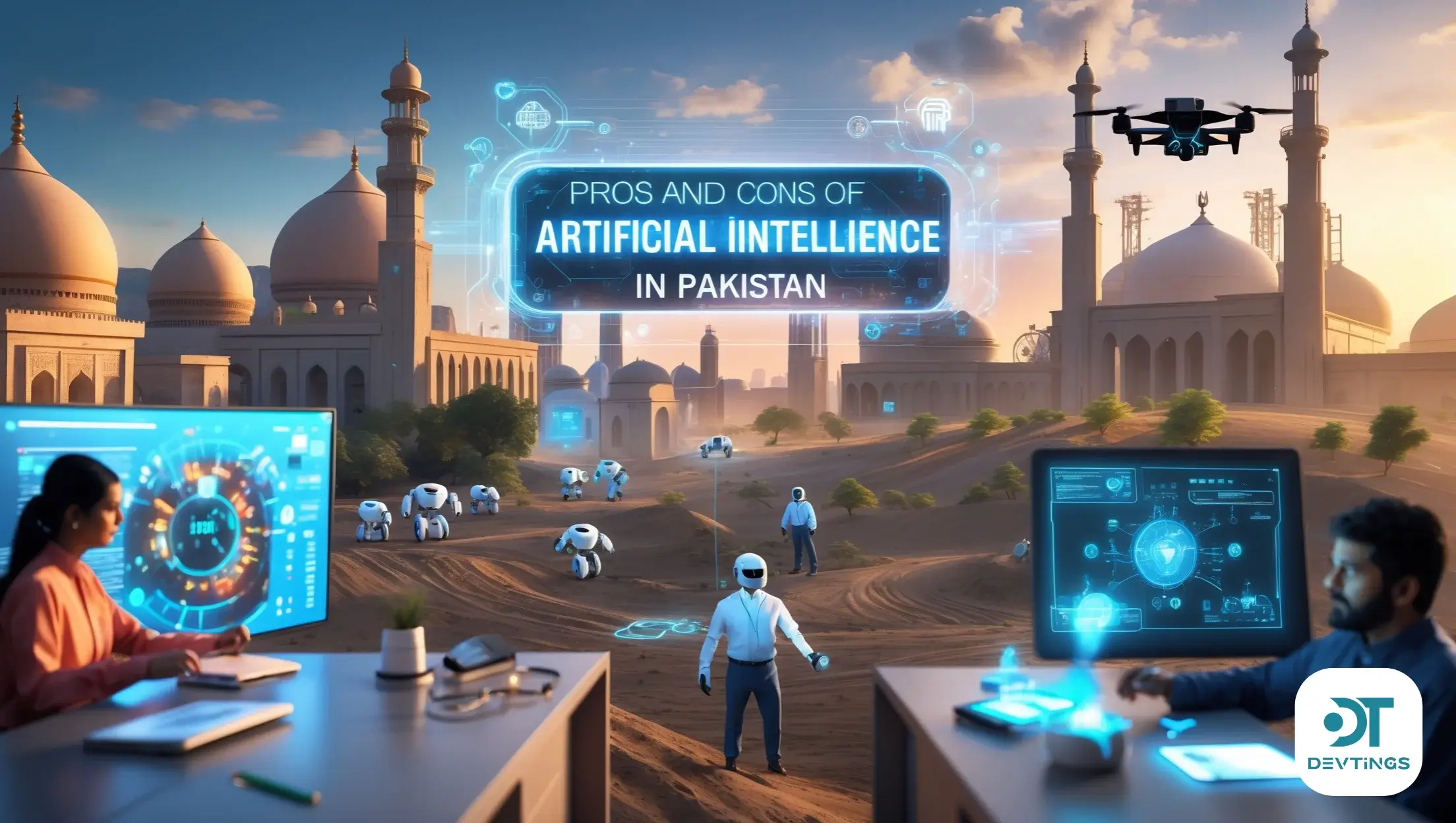Pros and Cons of Artificial Intelligence in Pakistan
Introduction
Pakistan is no exception to the revolution that artificial intelligence (AI) is having in the industries all around the world. AI is changing healthcare, education, construction, transportation and everything else, from becoming a core part of Pakistan’s technological and economic characteristics. Yet, like all technological progress, AI has its ups and downs, and they all have to be considered before implementing AI. In this article, the aspects of artificial intelligence in Pakistan such as its application, benefits, challenges and future potential are explained.
What is Artificial Intelligence?
Artificial intelligence deals with the simulation of human intelligence in machines to think and to learn as a human. AI has been in the limelight across all sectors in Pakistan due to its capability of boosting efficiency as well as generating creativity. In this it helps in automating process, data analysis and solving complex problems.
The Rise of AI in Pakistan
Pakistan has been very pro to AI technologies adoption. It also means AI-focused programs being set up in universities and the emergence of AI driven startups. But by no means has we arrived in terms of research, infrastructure and broaden adoption.
Benefits of Artificial Intelligence in Pakistan
The chances that AI can address some of Pakistan’s most serious challenges, such as low productivity, inefficiency, and a lack of access to quality education and health care are high.
- Improving Healthcare: AI-powered diagnostic tools can enhance the accuracy and efficiency of medical treatments.
- Boosting Education: Personalized learning platforms can make quality education accessible to remote areas.
- Streamlining Engineering: Applications in construction management and mechanical engineering increase precision and reduce costs.
- Enhancing Traffic Management: AI traffic control systems can help reduce congestion and improve urban planning.
AI in Education
The integration of AI into Pakistan’s education sector offers opportunities and challenges.
- Pros: Adaptive learning systems and virtual classrooms make learning accessible and engaging.
- Cons: High costs of implementation and a lack of trained educators remain hurdles.
AI in Healthcare
AI is reshaping healthcare in Pakistan by offering innovative solutions for diagnosis and treatment.
- Pros: Enhanced diagnostic accuracy, reduced costs, and telemedicine services.
- Cons: Privacy concerns and dependency on foreign AI technologies are notable challenges.
Top AI Courses and Universities in Pakistan
Several institutions offer AI-focused programs to foster the next generation of AI professionals.
- Courses in Major Cities:
- Islamabad: Advanced AI courses at universities like NUST and FAST.
- Lahore: AI degrees at LUMS and Punjab University.
- Karachi: Courses at Karachi University and SZABIST.
- Popular Programs: MS in artificial intelligence and specialized AI diplomas.
Challenges of AI Implementation in Pakistan
While AI promises to revolutionize various sectors, Pakistan faces several challenges:
- Limited infrastructure and funding.
- Shortage of skilled professionals.
- Resistance to change in traditional industries.
Ethical Concerns with AI in Pakistan
Ethical questions that arises because of AI include private data, direct bias algorithm and the requirement of regulatory mechanism. One of these concerns make responsible adoption of an AI technology necessary.
Future of AI in Pakistan
It is bright futures ahead for AI in Pakistan as more and more investment in AI research, education, and industry applications are being made. But as with anything else, solving what’s currently stopping progress is key to reaping its full potential.
FAQs
- What are the major applications of AI in Pakistan?
AI is used in healthcare, education, construction, traffic management, and engineering sectors in Pakistan. - Which universities offer AI courses in Pakistan?
Leading universities include NUST, LUMS, FAST, and Karachi University. - What are the challenges of implementing AI in Pakistan?
Challenges include economic barriers, a lack of expertise, and ethical concerns. - How does AI benefit education in Pakistan?
AI enhances education through adaptive learning platforms, virtual classrooms, and personalized tutoring. - What are some AI job opportunities in Pakistan?
AI professionals can explore roles in data science, software engineering, healthcare, and academia. - What is the future of AI in Pakistan?
The future holds promise, with growing investment in AI-driven technologies and educational programs.
Conclusion
Artificial intelligence in Pakistan is a huge opportunity to change industries and change lives. But to grow sustainably, it’s crucial to manage its problems. By education, research and infrastructure, Pakistan can use power of AI to create a better







